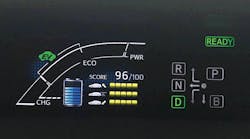When I get in my car, I slightly depress the gas pedal, easing out of my parking space as I look both ways and monitor my backup camera.
I slowly propel the car forward, allowing the hybrid engine to remain in the electric-gas sharing mode. And, as I near a stop sign, I apply slight pressure to the brake, letting the car glide to a gradual stop.
You see, my new car, a 2016 Prius, rates my driving. It's a silent passenger watching my every move, encouraging me through its presence to drive smarter.
With its new ECO score function, the new Prius grades the driver's efficiency performance. That is, it rates how well I am taking advantage of the hybrid nature of the vehicle and if I am doing my best to achieve its advertised 52 mpg ability.
Well done, Toyota.
The way to achieve any kind of lasting change is by tuning into what motivates people to get them on board. The ECO score function does exactly that. It forces me to confront how well I am taking care of the environment and how much money I am spending. Plus, it challenges me to do better each time, tapping into my competitive nature.
It makes driving a game, but one with real-world impact and consequences.
When I interviewed safety expert Orville Watson a year ago, I learned about how he used gamification to connect to his coworkers, to engage them.
Watson, who is the safety administrator for the Orange County (Fla.) Utilities Department and previously worked as a safety trainer in New York City, would fill his training sessions with interactive games. He'd quiz workers using Jeopardy and Family Feud formats, using the games to engage workers who might not have an innate interest in safety.
"It really livened up the class…It broke up the monotony," Watson said. "Safety can be boring, very technical."
The point is, the game served as a way to capture the interest of those workers putting themselves in harm's way and to show them a better way.
I drive 20 miles to work every day. On the highway, while I certainly haven't achieved my peak ECO score, I definitely am a lot more engaged in my driving.
I know I won't always be able to drive to my car's most environmentally-friendly ability, but I am more aware of my driving habits. More importantly, I am not zoning out as I move in unison with the other cars on that flat stretch of road that leads to the city – day in and day out.
The game alerts me to my weaknesses and makes me more cognizant of them. I have a tendency to alternate speeds while I'm driving, something that drives my passengers – and I'm sure other drivers – crazy. In physically seeing my car's performance vary as my speed vacillates, I am a lot more attuned to my shortcoming and consciously try to fix it.
I think we all have habits we know aren't the smartest or the safest. And sometimes, all we need is a gentle reminder to do better, to be better.
And if that reminder comes from a concerned coworker, an active passenger or a clever game, the result is the same: engagement and awareness. And maybe paying a little less at the gas station.
